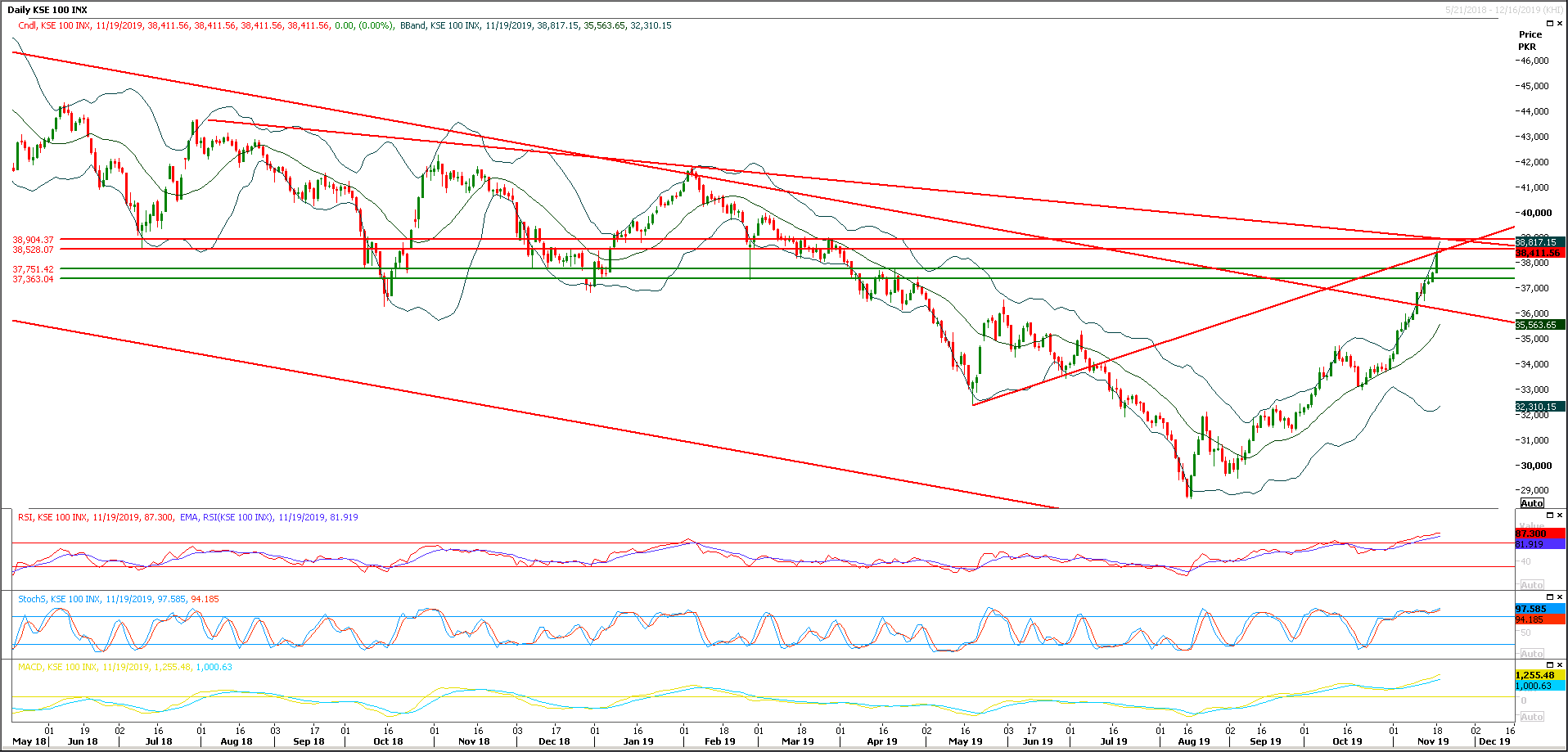Previous Session Recap
Trading volume at PSX floor dropped by 80.76 million shares or 17.33% on DoD basis, whereas the benchmark KSE100 index opened at 38,411.56, posted a day high of 38,911.46 and a day low of 38,393.61 points during last trading session while session suspended at 38,564.37 points with net change of 152.81 points and net trading volume of 246.09 million shares. Daily trading volume of KSE100 listed companies dropped by 22.70 million shares or 8.45% on DoD basis.
Foreign Investors remained in net buying positions of 1.53 million shares and net value of Foreign Inflow increased by 3.96 million US Dollars. Categorically, Foreign Individual and Overseas Pakistanis remained in net selling positions of 0.41 and 0.92 million shares but Foreign Corporate Investors remained in net buying positions of 2.85 million shares. While on the other side Local Individuals, NBFCs and Mutual Funds remained in net buying positions of 12.37, 0.77 and 13.55 million shares but Local Companies, Banks, Brokers and Insurance Companies remained in net selling positions of 9.58, 15.38, 1.71 and 2.80 million shares respectively.
Analytical Review
Asia shares trapped in a trade maze, oil nurses losses
Asian shares stumbled on Wednesday as the Sino-U.S. trade talks produced nothing but a stream of conflicting messages, while concerns about a glut of supply left oil prices nursing their biggest one-day loss in seven weeks. Figures from the American Petroleum Institute out late Tuesday showed a far larger rise in crude stocks than expected. That followed reports Russia was unlikely to deepen its cuts to crude output. Brent crude LCOc1 futures eased another 5 cents to $60.86 a barrel, after sliding 2.6% overnight, while U.S. crude CLc1 recouped a slight 8 cents to $55.29. The mood in share markets was subdued with MSCI's broadest index of Asia-Pacific shares outside Japan .MIAPJ0000PUS off 0.7%. Japan's Nikkei .N225 fell 0.8% and Shanghai blue chips .CSI300 0.3%. E-Mini futures for the S&P 500 ESc1 shed 0.26% and EUROSTOXX 50 futures STXEc1 0.2%.
New policy to strip FBR of tariff setting powers
The federal cabinet has approved the first-ever National Tariff Policy (NTP) that seeks to shift focus of tariff setting towards promotion of trade, particularly exports, rather than revenue generation. The decision was taken during a cabinet meeting on Tuesday chaired by Prime Minister Imran Khan who directed the Commerce Division to begin implementation on the policy from budget 2021. The power to charge tariffs and impose regulatory duties was also taken away from the customs department and placed with a special cell to be constituted under the Commerce Division. Implementation will be done through a Tariff Policy Board (TPB) chaired by the Commerce Minister/Adviser, with Minister for Industries and Production, secretaries of finance, revenue, commerce, Board of Investment, the Federal Board of Revenue (FBR) chairman and National Tariff Commission as its members.
Textile exports show meagre growth, oil imports fall in July-October
Pakistan’s textile and clothing exports grew by over four per cent year-on-year during the first four months of 2019-20, showed data released by the Pakistan Bureau of Statistics on Tuesday. The modest increase in export proceeds and the decline in import of oil and food products helped the government achieve a current account surplus in October after a gap of five years. Export of textile and clothing rose by 4.1pc to $4.58 billion in July-October period compared to $4.40bn in the corresponding months of last year. Meanwhile for October, the sector’s export proceeds were recorded at $1.214bn up by 7.44pc to $1.13bn in the same month last year.
$500m sought from WB for improving fiscal management
The government is seeking a loan of $500 million from the World Bank for a programme aimed at enhancing the policy and institutional framework to improve fiscal management. According to details shared on Tuesday, the Resilient Institutions for Sustainable Economy (Rise) project will support the government’s efforts to maintain macroeconomic stability while putting in place the foundations for sustainable growth. The World Bank executive board is expected to approve the request of loan in early 2020. The proposed operation is the first in a programmatic series of three operations focused on enhancing the policy and institutional framework to improve fiscal management; and improving the regulatory framework to foster growth and competitiveness. The proposed series will be complementary to the two-year development policy series Securing Human Investments to Foster Transformation (Shift).
Federal cabinet approves first-ever National Tariff Policy
The federal cabinet on Tuesday approved the much awaited first-ever National Tariff Policy (NTP) aimed to increase employment opportunities and to remove anomalies in the tariff structure. The NTP, developed by the Commerce Division after extensive consultations with the stakeholders, marks a milestone in the national economic policy paradigm by recognizing the importance of employing import tariffs for industrial development and export growth. Prime Minister Imran Khan, in his remarks during the Cabinet meeting, said that the import tariffs have been traditionally employed as a revenue generation tool, which has increased reliance on import tariffs for revenue collection. In accordance with the reform agenda of the government, the economic policy paradigm is now being realigned to leverage tariffs for industrial development.
Asian shares stumbled on Wednesday as the Sino-U.S. trade talks produced nothing but a stream of conflicting messages, while concerns about a glut of supply left oil prices nursing their biggest one-day loss in seven weeks. Figures from the American Petroleum Institute out late Tuesday showed a far larger rise in crude stocks than expected. That followed reports Russia was unlikely to deepen its cuts to crude output. Brent crude LCOc1 futures eased another 5 cents to $60.86 a barrel, after sliding 2.6% overnight, while U.S. crude CLc1 recouped a slight 8 cents to $55.29. The mood in share markets was subdued with MSCI's broadest index of Asia-Pacific shares outside Japan .MIAPJ0000PUS off 0.7%. Japan's Nikkei .N225 fell 0.8% and Shanghai blue chips .CSI300 0.3%. E-Mini futures for the S&P 500 ESc1 shed 0.26% and EUROSTOXX 50 futures STXEc1 0.2%.
The federal cabinet has approved the first-ever National Tariff Policy (NTP) that seeks to shift focus of tariff setting towards promotion of trade, particularly exports, rather than revenue generation. The decision was taken during a cabinet meeting on Tuesday chaired by Prime Minister Imran Khan who directed the Commerce Division to begin implementation on the policy from budget 2021. The power to charge tariffs and impose regulatory duties was also taken away from the customs department and placed with a special cell to be constituted under the Commerce Division. Implementation will be done through a Tariff Policy Board (TPB) chaired by the Commerce Minister/Adviser, with Minister for Industries and Production, secretaries of finance, revenue, commerce, Board of Investment, the Federal Board of Revenue (FBR) chairman and National Tariff Commission as its members.
Pakistan’s textile and clothing exports grew by over four per cent year-on-year during the first four months of 2019-20, showed data released by the Pakistan Bureau of Statistics on Tuesday. The modest increase in export proceeds and the decline in import of oil and food products helped the government achieve a current account surplus in October after a gap of five years. Export of textile and clothing rose by 4.1pc to $4.58 billion in July-October period compared to $4.40bn in the corresponding months of last year. Meanwhile for October, the sector’s export proceeds were recorded at $1.214bn up by 7.44pc to $1.13bn in the same month last year.
The government is seeking a loan of $500 million from the World Bank for a programme aimed at enhancing the policy and institutional framework to improve fiscal management. According to details shared on Tuesday, the Resilient Institutions for Sustainable Economy (Rise) project will support the government’s efforts to maintain macroeconomic stability while putting in place the foundations for sustainable growth. The World Bank executive board is expected to approve the request of loan in early 2020. The proposed operation is the first in a programmatic series of three operations focused on enhancing the policy and institutional framework to improve fiscal management; and improving the regulatory framework to foster growth and competitiveness. The proposed series will be complementary to the two-year development policy series Securing Human Investments to Foster Transformation (Shift).
The federal cabinet on Tuesday approved the much awaited first-ever National Tariff Policy (NTP) aimed to increase employment opportunities and to remove anomalies in the tariff structure. The NTP, developed by the Commerce Division after extensive consultations with the stakeholders, marks a milestone in the national economic policy paradigm by recognizing the importance of employing import tariffs for industrial development and export growth. Prime Minister Imran Khan, in his remarks during the Cabinet meeting, said that the import tariffs have been traditionally employed as a revenue generation tool, which has increased reliance on import tariffs for revenue collection. In accordance with the reform agenda of the government, the economic policy paradigm is now being realigned to leverage tariffs for industrial development.
Market is expected to remain volatile during current trading session.
Technical Analysis
The Benchmark KSE100 index is being capped by a horizontal resistant region at 38,530 points and this region would try to push index downward but penetration above said region would call for 38,900 points where it would face resistance from crossover of a horizontal resistance with a descending trend line. While on flip side index have supportive regions standing at 37,760 an 37,400 points. It's that index would try to target 39,200 points if it would succeed in maintaining above 37,800 points during current trading session therefore swing trading between 37,800 and 39,200 points is recommended until a clear breakout of either side take place.
 To Open picture in original resolution right click image and then click open image in a new tab
To Open picture in original resolution right click image and then click open image in a new tab


0 Comments
No comments yet. Be the first to comment!
Please log in to leave a comment.